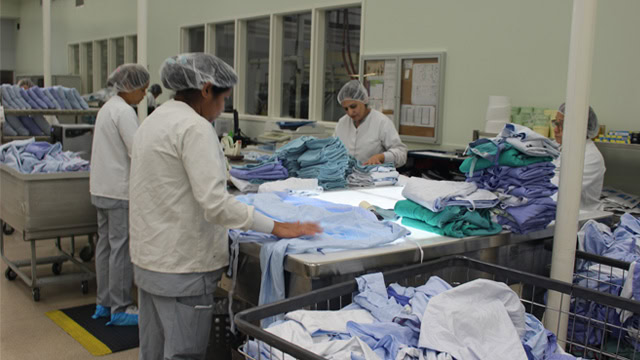Healthcare & COVID-19: Dispatches from the Front Lines

Four TRSA healthcare laundry operators – all serving hospitals located in the epicenters of the pandemic in the U.S. – shared lessons with industry colleagues during an April 10 TRSA webinar on how they’re working to protect employees, while at the same time providing maximum assistance to customers and end users through the use of sound business practices that can deliver the best outcomes for everyone.
Sometimes that means saying no to customers who want delivery of 10,000 barrier gowns at a time when supply chains are exhausted the lead times for delivery of such goods from overseas can take eight weeks or longer with much higher costs. It also means working closely with customers to make sure that safety procedures, such as not allowing soil to arrive at the laundry in loose form or in open bags, due to the risks that poses to laundry route and soil-sort personnel. Fortunately, most hospital clients understand the reasons behind these practices – but COVID-19 has mandated even more than the usual amount of customer consultation at a time when hospital staff and managers are operating under extremely stressful conditions.
The webinar featuring healthcare operators drew nearly 150 registrants. This was the latest in a series of online educational forums that TRSA has provided during the COVID-19 crisis. The online program featured a geographically diverse group of healthcare laundry operators, including;
- Eddie Lefeaux, Owner, Westport Linen, Baton Rouge, LA
- David Potack, President, Unitex (NY, NJ, CT and NE)
- Plato Spilios, Co-President and Principal, Crown Uniform & Linen Service, Boston, MA
- Kelsey Van Miert, Vice President of Customer Relations, Northwest Health Care Linen, Seattle, WA
Randy Bartsch, CEO, Ecotex Healthcare Linen Service, Vancouver, Canada, moderated the one-hour session that began at 11:30 a.m. EDT. The webinar gave the four operators a chance to compare and contrast their experiences going back to January or earlier as they began to prepare for a surge of linens coming from hospitals with patients suffering from COVID-19. Bartsch noted that the U.S. currently has some 466,000 cases of COVID-19. Roughly one-third of those cases, some 220,000 in all, are in New York and New Jersey.
All four of the panelists described extensive efforts they made early in the crisis that began developing late last year to protect laundry staff. Several cited information provided by TRSA and the Centers for Disease Control and Prevention (CDC) on sanitizing various surfaces, making hand sanitizer available to all employees and encouraging regular handwashing. In addition to training soil sort and other plant employees in the use of PPE, Van Miert and others said they’ve extended the use of masks and other protective gear to office staff to maximize the odds of preventing COVID-19 infections among laundry employees. Spilios said his company has added UV lighting to all its HVAC ducts. “That’s killing everything that might get circulated around in our air system,” he said.
Only one of the operators said they’d had a case of an employee getting the COVID-19 coronavirus. That staff member was quickly sent home to recuperate and no other other employees were infected. Several operators described how they’ve implemented testing and policies aimed at keeping anyone who feels ill or shows symptoms of COVID-19 from being at work where they could pose a risk to others.
The training and precautions have helped staff deal with the stress of COVID-19. Potack said morale in his company’s 11 facilities was high because staff have a strong sense of purpose and a feeling of solidarity with the healthcare community that’s trying to fight the battle against COVID-19. “It’s a very emotional time, but I’m incredibly proud of our team members and the job they’ve doing every day,” Potack said. “And of our clients and the job that they’re faced with every day. It appears insurmountable but they continue to get after it every day. It’s pretty inspiring.”
While it might seem counterintuitive, even with the surge of COVID-19 cases, especially in the New York area that Unitex services, linen use is down sharply, by 30% or more, Potack said. The other operators are seeing similar declines on linen use of up to 40% at outpatient centers. The reason is two-fold: 1) elective surgeries and other voluntary hospital visits have been postponed as healthcare staffs focus on the COVID-19 crisis. 2) the use of linen by COVID-19 patients is closer to the amount used by nursing home residents, Potack said. Fewer changes of bed linens mean less laundry for the operators to process.
That could change if the rate of COVID-19 infections continues to increase, but the operators are hopeful that bending the curve of infections could mean that the situation begins to taper off in the next four-to-six weeks. Until then, the operators said they’re moving employees around, trying to avoid layoffs.
In Van Miert’s case, North West Health Care Linen is taking extra precautions with linens from COVID-19 patients by requiring hospital staff to place the linens in double bags that are colored purple, so that laundry staff know exactly what they’re getting. While the CDC doesn’t require any special treatment of these linens beyond the use of standard “Universal Precautions” several of the operators said hospitals are supportive of the laundries’ efforts to make employee safety their No. 1 priority, now and for the duration of the pandemic. “Everyone was very afraid when they learned this linen was coming through,” Van Miert said, speaking of her staff. “We wanted to make sure that everybody knew that we were focusing on taking care of them.”
TRSA offers more than 100 industry-specific professional development and training programs on a range of issues including emerging regulatory/compliance issues, safety, best practices and strategies for enhancing productivity. Visit www.trsa.org/ondemand to access TRSA’s On-Demand Learning portal.
